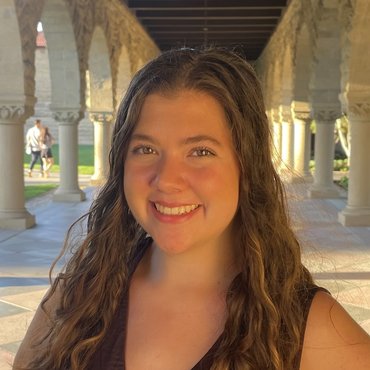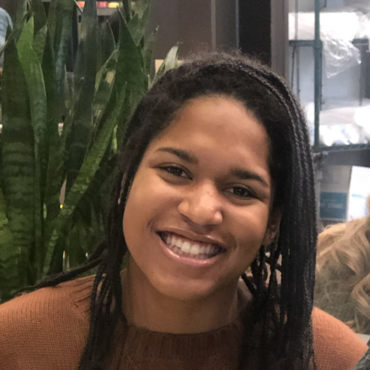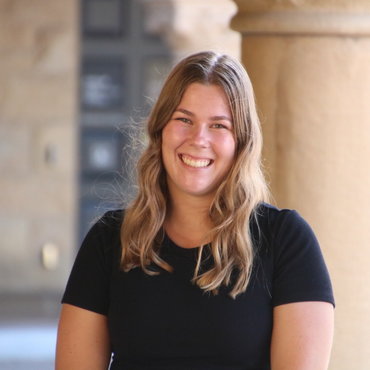
Komal Kumar, '20, and Zane Norville, '21
Serving Those Who Have Served: 25 Years of United Students for Veterans' Health
By Erika DePalatis, '19
It all began in 1994.
While volunteering in the Alzheimer's Ward of the Palo Alto Veterans Affairs Administration Hospital, Vance Vanier, a Stanford undergraduate studying economics and political science, noticed that many of the patients were suffering from loneliness.
With little connection to the outside world, many of these veterans rarely had the opportunity to interact with others, outside occasional family visits and planned events. Worse still, patients in this long-term care ward often experienced cognitive impairments such as Alzheimer's disease or other forms of dementia, which can make patients feel confused or distressed when isolated.
These veterans had served their community; Vanier wanted to help organize their community to serve them. Rallying forty other volunteers, Vanier founded United Students for Veterans' Health (USVH) with the goal of building caring, meaningful relationships between students and long-term care patients in Veterans Affairs (VA) Hospitals. Vanier's brother, Andre, launched USVH's national expansion the following quarter and thereafter expanded his role as the chair of USVH's National Advisory Board.
Over the years, USVH has expanded across the United States, becoming one of the first nationwide student organizations connecting students with hospitalized veterans. Chapters at the University of Southern California and University of Alabama were founded several years ago, and the group's sustained growth still continues: earlier this year, a new USVH chapter was established at the University of San Francisco, supported by the diligent efforts of USVH's national co-presidents, Stanford students Komal Kumar, '20, and Zane Norville, '21.
"Our chapter in San Francisco has been a long time coming. The veteran population at the SFVA hospital is conveniently located near two undergraduate universities, San Francisco State University and the University of San Francisco. ...e are proud to say the program is launching now, with a group of six dedicated pilot student volunteers," explains Kumar.
The original Stanford chapter of USVH, however, has never forgotten the local need which first started this national organization. Each fall, USVH recruits new volunteers to serve veterans at the Menlo Park Veterans Affairs Hospital (MPVA). Student volunteers visit the hospital's long term care facility, where many of the veterans have been living for several years, and, through weekly visits, build meaningful friendships. The group's connection with the local veteran community has only grown during its many years of operation, as evidenced by the group hosting an increasing number of events at the hospital each quarter, including an event this past fall that attracted the highest veteran turnout in USVH's history, with over 25 veterans in attendance.
"The hospital can be a dismal and lonely place for some of the veterans," explains USVH alumni John Rodgers, '19. "Although it could feel like a small thing to visit the VA once a week, listening to someone's story and really trying to get to know them can go a long way toward improving their time in the hospital."
In addition to the relationships built between USVH participants and veterans, USVH plays an important role on campus by hosting educational events that inform the campus community about issues affecting veterans. For example, USVH partnered with the Stanford United Veterans Association (SUVA) in October 2019 to host two SUVA representatives and a VA psychiatrist for a panel discussion on veterans' portrayal in the media.
This year, USVH celebrates its 25th year of partnership with the Haas Center for Public Service, during which time USVH volunteers have reported serving over 50,000 hours at the MPVA. In partnership with the Haas Center, USVH honors students who sustain their involvement with the group for at least three quarters by offering them a Cardinal Commitment certification. Since the launch of the Cardinal Commitment program just two years ago, 16 USVH students have received this certificate.
The thought of over-scheduled Stanford students consistently making time each week to visit elderly veterans might strike some as surprising; but Kelly Beck-Sordi, Haas Center Associate Director and Director of Cardinal Commitment, would explain that, instead, the dedication of USVH student volunteers is just one example of the growing culture of service on campus.
"Every year, hundreds of Stanford students make year-long commitments to serve with student groups, community organizations, and campus programs, from teaching local youth how to code to advocating for workers' rights," Beck-Sordi explains. "USVH has been very successful in engaging students over the years, and that's because students care about serving those who have served our country. Students want to give back."


